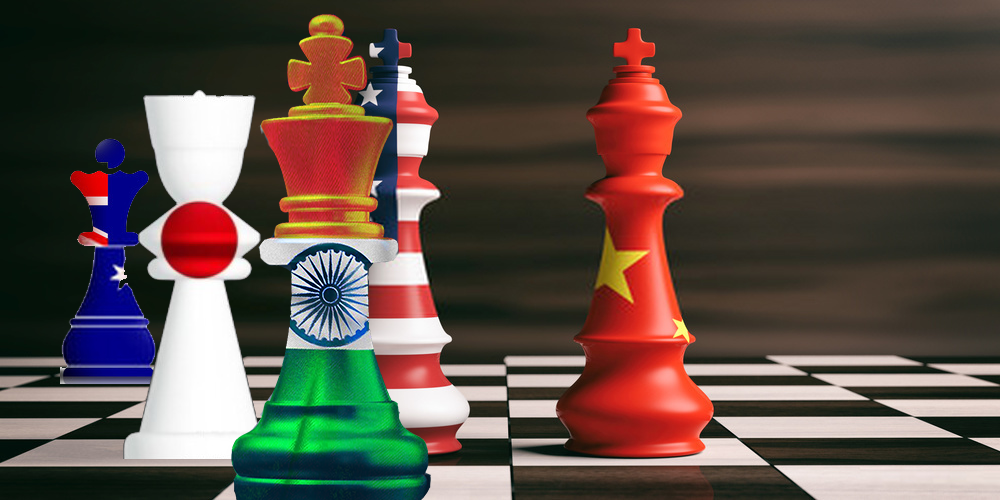by Zafar Iqbal Yousafzai 13 November 2021
In the new millennium, Indo-Pacific has become a new theatre of international strategic competition. All major powers are asserting their presence and try to consolidate their positions in addition to the formation of alliances or groups to collectively protect converging interests. China is one of the main players in the region which has bitter relations with other global and regional powers. Hence, the formation of alliances and groups are keep continuing. Quad and AUKUS are prime examples of grouping in order to collectively safeguard interests.
Quad or Quadrilateral Security Dialogue is comprised of the US, Australia, Japan and India aim to work for peace, prosperity, security, and stability in the Indo-Pacific region. Cooperation among the members began following the Tsunami in 2004 in the Indian Ocean. In 2007, the group held its first meeting aiming at a free and open Indo-Pacific. The group today is working on a broader agenda having economic, health, and security components. Still, Quad is not an alliance but a loose group.
Quad aims to counter the rising Chinese clout and assertion in the Indo-Pacific region. Quad members’ relationship with China has not been smooth during the pandemic and even for the last decade. Japan and India have border issues with China, Australia relations are worse with China following the Covid-19 investigation by Australia about its origin. And above all, US-China tension has been high for several years. All group members bring them together having their own interests however one objective is common: containing assertive China. Chinese believe that Quad is to split Asia by instigating regional powers to contain the Chinese clout. However, by any move against the Chinese interests, these regional powers may become cannon powder as China will respond to safeguard its interests.
Similarly, Quad members in November last year held their biggest Naval exercise in the Indian Ocean signaling to counter China’s political and military clout in the Indian Ocean Region (IOR). President Trump in his visit to Japan, China, the Philippines, South Korea, and Vietnam frequently used the word Indo-Pacific rather than Asia-Pacific that indicated the U.S. policy is diverted to the Indo-Pacific in the region.
China’s emergent clout worries Washington among other powers like India where they challenge the regional status quo. China is under criticism for crackdown over minorities like Uyghurs, Hong Kong which kept continue even during the pandemic. China has its eyes on Afghanistan which would be a corridor for Belt and Road project. Hence, there are many fronts where states en-bloc to China will have to resist.
The quad would also have implications for Pakistan where India is its member. The growing Indian influence in the Indian Ocean Region is a serious concern for Pakistan. Pakistan’s 95 percent trade is through sea where its economy is mostly dependent on secure sea lines of communications. Islamabad has limited resources in which it cannot afford to keep check posts that could let its trade convoys go smoothly. Similarly, the security of the seaports is another concern in case of any Naval conflict. Indian nuclear submarines in the region are also a grave concern that could provide for a strategic imbalance.
Underpinning the Pak-China relationship has a strong convergence: India should not dominate the Indian Ocean Region besides South Asia. India-China tussle gives Pakistan an enormous edge against India. China is not only assisting Pakistan economically and militarily but also guarding its interest in the UN Security Council as a permanent member. CPEC and BRI are further factors that grow China’s interests in a strong and stable Pakistan.
India being its member, Quad is considered a serious challenge for Pakistan. The question is how Pakistan could deal with such a concerning situation? Islamabad on one had to maintain its smooth relations with Washington while on the other, it has to balance India. Pakistan assumes Indo-US close partnership in the Indian Ocean Region as a ‘nexus’ that will resultantly undermine Pakistan’s interests. In case of strong India-US ties or India being a member of a strategic group like Quad will imbalance the balance of power in South Asia and will further push Islamabad towards Beijing and Moscow as we have seen recently. Pakistan has been trying to keep smooth relations with the US despite its close strategic partnership with India. Still Quad is a loos organization yet if it widens its scope to strategic and military cooperation among the members, it will become a real challenge for China and Pakistan which will need practical measures to tackle with.

